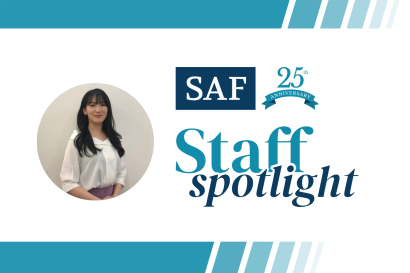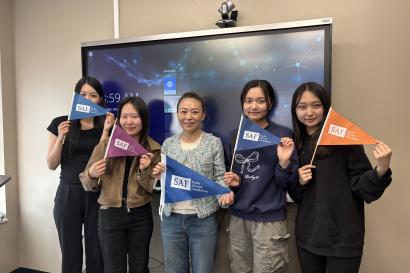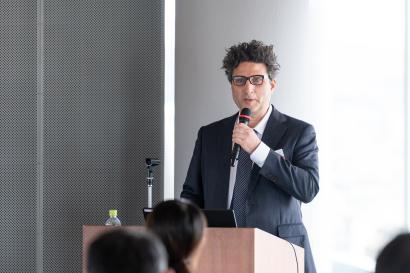Korean students are known for their affinity to travel and study abroad, but have largely been grounded from their plans to study internationally, in light of COVID-19. With news of vaccination roll-outs and re-opening borders in countries like the US and Great Britain, Korean students and universities alike were optimistic about a resumption of study abroad programs this fall.
However, with daily case numbers surging in the country, the picture has become more complex and nuanced. We speak with Suyeon Lee, our new SAF Korea head, to learn more about what’s happening on the ground in South Korea, and what partner universities can do to bolster enrollments.
SAF: How would you describe the sentiment towards studying abroad right now?
Suyeon Lee: People are very cautious. We’re recording more than 2,000 new COVID-19 cases a day right now – an all-time high. Because of this domestic situation, Korean parents aren’t very encouraging of study abroad at this moment.
Students, on the other hand, will always want to study abroad and remain very keen on the prospect. Although parents are worried about sending their kids overseas, we are expecting vaccinations for younger demographics soon, which I think will make a big difference in their willingness to send family members abroad.
SAF: What is the current roll-out vaccination plan in Korea, and how do you predict that will affect students and their study abroad plans?
Vaccinations for people in their 20s will start from September here, and it’s expected that most university-age students will complete their first round of vaccinations by the end of November. I think parents will feel hugely relieved at that point, and can then start preparing for departures abroad. Parents are not saying no for forever, but just until they’re able to secure a vaccine.
SAF: What do Korean students tend to look for when studying abroad?
There are three different kinds of Korean student profiles, each looking for different things. First are students enrolled in prestigious universities in Korea who want to study at Harvard, Columbia, Oxford – the top-ranked schools in the world.
Then, there are students who both want to improve their English and study abroad at a state level school – University of California or Michigan State, for example.
The third profile are students looking for more economical choices. They don’t mind whether the university is in big cities or has many Korean students, as long as tuition is affordable. They view their time abroad as an opportunity to hone their English skills with native speakers.
SAF: Has that changed since COVID-19?
In terms of those three buckets, not much has changed. But more generally, I think Korean students right now are looking for universities who can provide quick and up-to-date COVID-19 announcements and related news.
They expect more than just a COVID-19 policy posted on the university homepage. They want university staff who will reach out individually and let them know what the campus is preparing for international students, as well as ease any anxieties or concerns. They need to know how vaccinations for international students will be coordinated, and how the quarantine process will take place.
SAF: How do study abroad offices in Korean universities differ from those in the west? How might that affect students?
In bigger, universities, like Yonsei University or Seoul National University, they have a robust workforce, 10 people or more, that can develop their exchange student programs and partnerships with foreign universities. But there are many smaller private universities who can only employ so many staff – they simply don’t have the resources to handle the demand. So we provide a valuable service for those universities with very small partner portfolios and limited time to consult with students.
Certain team members will also rotate frequently, particularly in directorial positions. The directors of Korean study abroad offices are usually professors who are appointed to their roles for a maximum of two or three years. This is in the interest of fairness, but it can affect the relationships of those offices with lesser-ranked universities when the turnover at that level is so high.
Add to that, the staff doing the more nitty gritty, administrative work also tend to be hired for very short-term periods; they’re not even full-time workers and they’re paid very little. So, they stay for one or two years just to get the experience. The managers of the study abroad offices will stay longer – I’ve talked with managerial staff who have been in their role for over 10 years – but it can be a challenge to build a relationship with the right person.
SAF: How does that staffing approach affect partner universities?
For universities who have built a relationship over a long period or who are already seen as prestigious, they wouldn’t have any problems. But other lesser-known universities may start to lose ground in terms of their brand awareness in Korea. I think it’s fair to assume that new directors or staff who have only just arrived at the international office may lose interest in keeping or developing partnerships with lower-ranked universities, unfortunately.
SAF: In the next 12-18 months, what can we expect to be the main influencers on the Korean study abroad market?
I think added value will be key. Off-campus experiences in addition to their regular academic programs are really attractive to Korean students, particularly with STEM. Something that relates to a real-world view of their future industry, and potential employability in the field.
So for example, computer science students need to visit top tech companies. This is especially relevant for lesser-known universities who are trying to distinguish themselves. There isn’t much distinction at this level in terms of tuition, ranking, or specialties, so if one of them offers some added value in the form of extra-curricular trips that relate to future employability, Korean students will be very attracted by that.
They’re also hoping that their host universities can help them overcome a lack of confidence in English. If a university offers writing clinics, or can offer tutors that will meet on a regular basis for help with their essays, they would love that kind of service.



